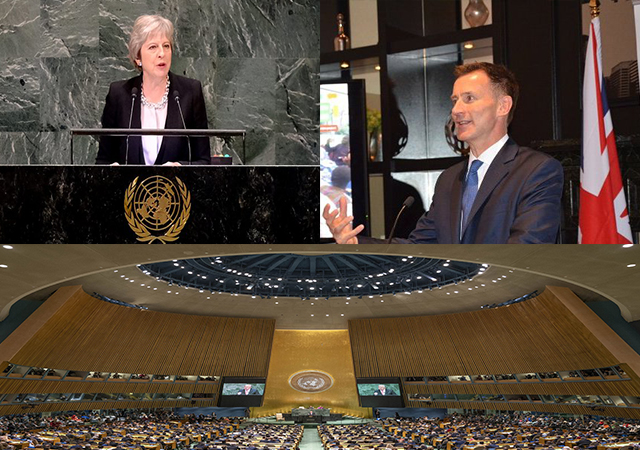 Theresa May and Jeremy Hunt dealt with Commonwealth issues at the UN General Assembly. [photos: UK government and the UN]
Theresa May and Jeremy Hunt dealt with Commonwealth issues at the UN General Assembly. [photos: UK government and the UN]
The United Kingdom has reported on its five months as Commonwealth Chair-in-Office during the 2018 United Nations General Assembly (UNGA).
In a meeting held on the fringes of the UNGA, Foreign Secretary Jeremy Hunt, announced to Commonwealth foreign ministers in New York that the UK will be contributing £1.8m to the Commonwealth’s electoral observation programme. The April 2018 Commonwealth Heads of Government Meeting (CHOGM) had agreed to the first update to Commonwealth election observation guidelines in 27 years.
Reporting on other developments since the April CHOGM, Mr Hunt said that the UK and Kenya had hosted the Global Disability Summit, that Vanuatu had been the first country in the world to put in place a ban on a range of single-use plastics with other Commonwealth nations making similar announcements this year and he spoke about the Commonwealth SheTrades programme launched in Ghana, Kenya, Bangladesh and Nigeria, with over 1,300 women entrepreneurs now registered.
Commonwealth Foreign Ministers also met on 27 September on the fringes of the UN sessions. On Guyana’s long-running dispute with Venezuela over territory which is currently before the International Court of Justice (ICJ), the Commonwealth foreign ministers issued a statement in New York expressing ‘their unequivocal and collective support for the maintenance of the sovereignty and territorial integrity of Guyana and its unimpeded right to the development of the entirety of its territory’.
During her speech to the UN General Assembly on 26 September, UK Prime Minister Theresa May, as Commonwealth Chair-in-Office, said: “We reaffirm our shared commitment to work together within a rules based international system to address shared global challenges and foster a fairer, more secure, more sustainable and more prosperous future. This commitment takes account of the special requirements of least developed countries, and of small and otherwise vulnerable economies, and it benefits all our citizens and the wider world. But it is not enough for us merely to make the case for cooperation. We need action, at home and in the community of nations, to show how our ideas and values can deliver practical benefits for all our people in all parts of the world. We must recognise the legitimacy of people’s concerns and act to build a global economy that works for everyone.”
Theresa May at the 2018 UN General Assembly video:
Related articles:
Commonwealth family demonstrates power of multilateralism, says Secretary-General
Call for the Commonwealth Ministerial Action Group to take a stand on Cameroon



